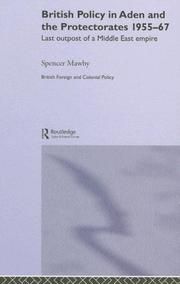| Listing 1 - 3 of 3 |
Sort by
|

ISBN: 1135771707 1280254246 9786610254248 0203495217 9780203495216 6610254249 9780714654591 0714654590 0714654590 9781135771652 9781135771690 9781135771706 9781138867772 Year: 2005 Publisher: London New York Routledge
Abstract | Keywords | Export | Availability | Bookmark
 Loading...
Loading...Choose an application
- Reference Manager
- EndNote
- RefWorks (Direct export to RefWorks)
This is the first detailed account of the confrontation between Britain and President Nasser of Egypt over the Colony of Aden and the surrounding protected states, prior to British withdrawal in 1967. Paying particular attention to the conflicting goals of Arab nationalism and British imperialism, it is argued that Britain's motivation for this campaign was not solely material but was partly derived from a determination to contain Nasser's influence and to guarantee a continuation of Britain's role in influencing the politics of the Arabian peninsula. Mawby argues that a significant
Great Britain --- Yemen (Republic) --- Yemen, South. --- South Yemen --- Ĭemen (Republic) --- Yaman (Republic) --- Jemen (Republic) --- Ėl'-Iemen (Republic) --- Yaman al-Shamālī --- Republic of Yemen --- Yamanīyah (Republic) --- Jumhūrīyah al-Yamanīyah --- Ǧumhūriyyah al-Yamaniyyah --- يَمَن (Republic) --- Jumhūriyyah al Yamaniyyah --- Yamaniyyah (Republic) --- جمهورية اليمنية --- Republiek van Jemen --- Yeme (Republic) --- República de Yeme --- Емен (Republic) --- Emen (Republic) --- Еменская Рэспубліка --- Emenskai︠a︡ Rėspublika --- Йемен (Republic) --- Република Йемен --- Republika Ĭemen --- Shádiʼááhjí Ásáí Bikéyah --- Jeemen (Republic) --- Jeemeni Vabariik --- Υεμένη (Republic) --- Yemenē (Republic) --- Δημοκρατία της Υεμένης --- Dēmokratia tēs Yemenēs --- República de Yemen --- República del Yemen --- Jemeno --- Yemengo Errepublika --- République du Yémen --- Poblacht Éimin --- Éimin (Republic) --- Yeaman (Republic) --- Pobblaght ny Yeaman --- Eaman (Republic) --- Poblachd Iemein --- Йеменмудин Орн --- Ĭemenmudin Orn --- 예멘 (Republic) --- イエメン (Republic) --- Yemen (Arab Republic) --- Yemen (People's Democratic Republic) --- Foreign relations --- Република Йемен --- Йемен (Republic) --- Йеменмудин Орн
Book
ISBN: 0333735811 Year: 1999 Publisher: Houndmills Basingstoke London Macmillan Press
Abstract | Keywords | Export | Availability | Bookmark
 Loading...
Loading...Choose an application
- Reference Manager
- EndNote
- RefWorks (Direct export to RefWorks)
Book
ISBN: 1350051829 1350051802 Year: 2020 Publisher: London [England] : [London, England] : Bloomscury Academic, Bloomsbury Publishing,
Abstract | Keywords | Export | Availability | Bookmark
 Loading...
Loading...Choose an application
- Reference Manager
- EndNote
- RefWorks (Direct export to RefWorks)
"The negative legacy of the British empire is often thought of in terms of war and economic exploitation, while the positive contribution is associated with the establishment of good governance and effective, modern institutions. In this new analysis of the end of empire in Uganda, Spencer Mawby challenges these preconceptions by explaining the many difficulties which arose when the British attempted to impose western institutional models on Ugandan society. Ranging from international institutions, including the Commonwealth, to state organisations, like the parliament and army, and to civic institutions such as trade unions, the press and the Anglican church, Mawby uncovers a wealth of new material about the way in which the British sought to consolidate their influence in the years prior to independence. The book also investigates how Ugandans responded to institutional reform and innovation both before and after independence, and in doing so sheds new light on the emergence of the notorious military dictatorship of Idi Amin. By unpicking historical orthodoxies about 20th-century imperial history, this institutional history of the end of empire and the early years of independence offers an opportunity to think afresh about the nature of the colonial impact on Africa and the development of authoritarian rule on the continent."--
Uganda --- Great Britain --- Politics and government. --- History. --- Foreign relations
| Listing 1 - 3 of 3 |
Sort by
|

 Search
Search Feedback
Feedback About UniCat
About UniCat  Help
Help News
News